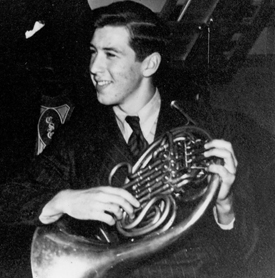Gunther Schuller’s newly published autobiography is the occasion for my “Sightings” column in today’s Wall Street Journal. Here’s an excerpt.
* * *
If you’d done a quarter of what Gunther Schuller has done in his lifetime, I’d want to read your memoirs, too. Mr. Schuller, who turns 86 next month, is a much-admired classical composer and conductor and a distinguished jazz scholar. Before that, he was the principal horn player of the Metropolitan Opera Orchestra. He is the only musician in the world who can claim to have played with Maria Callas, Miles Davis, Ethel Merman, Frank Sinatra, Igor Stravinsky and Arturo Toscanini. In “Gunther Schuller: A Life in Pursuit of Music and Beauty,” just out from the University of Rochester Press, he talks about all this and much, much, much more. Mr. Schuller’s autobiography, which takes him up to 1957, is a 654-page monster that appears not to have been edited by anyone, least of all the author. It’s garrulous, unselective and riddled with errors (somebody really needs to tell Mr. Schuller how to spell Ralph Vaughan Williams’ name). I don’t care. I couldn’t put it down, and I can’t wait until he finishes the second volume.
 Paradoxical as it may sound, it is Mr. Schuller’s lack of discrimination that helps to make “Gunther Schuller” so compulsively readable. Yes, he’s led an unusually varied life, and no, we don’t need to hear about all of it, or even most of it. But it is precisely because he thinks otherwise that Mr. Schuller has inadvertently given us what amounts to a cultural history of America in the ’40s and ’50s, viewed through the prism of his personal experience. If you’re not especially interested in what he’s talking about at any given moment, all you have to do is turn the page.
Paradoxical as it may sound, it is Mr. Schuller’s lack of discrimination that helps to make “Gunther Schuller” so compulsively readable. Yes, he’s led an unusually varied life, and no, we don’t need to hear about all of it, or even most of it. But it is precisely because he thinks otherwise that Mr. Schuller has inadvertently given us what amounts to a cultural history of America in the ’40s and ’50s, viewed through the prism of his personal experience. If you’re not especially interested in what he’s talking about at any given moment, all you have to do is turn the page.
I was especially interested in what Mr. Schuller had to say about “Fantasia,” Walt Disney’s 1940 animated feature film about classical music, which he saw for the first time when he was 14: “That film masterpiece truly changed my life, particularly its Stravinsky ‘Rite of Spring’ sequence, which, as far as I can remember, was the first time I heard that remarkable music. It completely bowled me over. I knew then and there that I had to be a composer.”
Needless to say, snobs of all kinds have long taken a dim view of “Fantasia,” with its dancing mushrooms and cavorting hippos. Not so Gunther Schuller: “I hope [Stravinsky] appreciated that hundreds–perhaps thousands–of musicians were turned onto ‘The Rite of Spring’ (and by implication lots of other modern music) through ‘Fantasia,’ musicians who might otherwise never have heard the work, or at least not until many years later.”
I’m with Mr. Schuller. Hollywood used to do a lot to introduce youthful moviegoers to the joys of classical music….
* * *
Read the whole thing here.
The Rite of Spring sequence from Fantasia. Stravinsky’s score is performed by Leopold Stokowski and the Philadelphia Orchestra:
Terry Teachout on the arts in New York City
An ArtsJournal Blog
